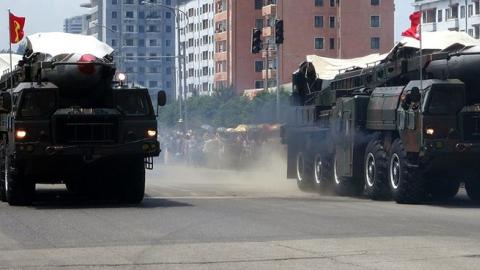After Pyongyang’s latest missile test this Sunday, the Wall Street Journal has taken the pulse of expert opinion on North Korea’s missile technology. And the outlook is grim, with Pyongyang making critical gains on multiple fronts far faster than many had expected:
While most U.S. policy makers remain concerned about North Korea’s ability to deliver a nuclear-tipped missile to the continental U.S., the speedy development of the Pukguksong-2, or the Polaris-2, highlights how quickly North Korea is mastering other critical missile technologies that are making Pyongyang a bigger threat to the U.S. military and its allies in East Asia.
The missile, while not designed to reach beyond most of the U.S. bases in South Korea and Japan, can be fired with almost no preparation time from the back of a mobile launcher, giving North Korea more stealth in its launches, as well as the ability to retaliate in the case of a strike against it, experts say. […]
The declaration of success with the Polaris-2, which the U.S. calls the KN-15, comes just a week after North Korea launched a new missile, the Hwasong-12—which experts say is capable of flying 2,800 miles, more than enough to reach the U.S. base in Guam and farther than any weapon that North Korea has successfully fired to date. Both the Polaris-2 and Hwasong-12 are capable of carrying nuclear warheads, North Korea says.
What happens when a can-kicking foreign policy approaches the end of the road? All the options get worse, yet the need to choose one grows.
The U.S. is coming ever closer to the binary choice of war with North Korea or acceptance that North Korea, despite decades of categorical U.S. threats and promises to allies that its nuclear drive will be halted, has succeeded in developing a nuclear capability that deters the U.S. from attacking it.


















